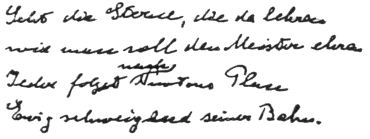“…and of all literary rights and assets shall be vested in the Hebrew University,…”
Excerpt from Albert Einstein’s will, 1950
ALBERT EINSTEIN ARCHIVES IN JERUSALEM
In his will Albert Einstein ordered that his secretary Helen Dukas (1896-1982) and Dr. Otto Nathan (German-American economist, 1893-1987) should take care of his literary assets during their lifetime. Thereafter his literary assets should belong to the Hebrew University in Jerusalem.
At the time of his death Einstein’s written heritage comprised about 14,000 documents. Through the great engagement and thanks to the untiring commitment of Helen Dukas and Dr. Otto Nathan many documents from Einstein were collected, sighted, sorted and evaluated. Thus the number of documents could be enlarged to approximately 42,000 documents in the years from 1955 to 1982.
To make Einstein’s written heritage more accessible to researchers, Helen Dukas and the physicist Gerald Holton introduced a new classification system in the 1960ies.
In 1982 the administrators assigned the rights of Einstein’s heritage to the Hebrew University in Jerusalem. There it found its final destination in the Albert Einstein Archives which had been established in Jerusalem in the Jewish National and University Library.
Today there are about 55,000 filed documents. 10,000 of these documents are from Einstein himself, partly in handwriting. The other documents are copies, i.e. transcripts of Einstein’s originals as well as letters and manuscripts Einstein received.

Duplicates of the Einstein Archives in Jerusalem are to be found in Pasadena, Princeton and Zurich (ETH). Smaller collections of Einstein documents are to be found for example in the Leo-Baeck-Institute in New York, in the Staatsarchiv Preußischer Kulturbesitz (State Archive of Prussian Cultural Heritage) in Berlin and in the California Institute of Technology in Pasadena.
Further filed documents which were still to be found in Einstein’s home in Mercer Street 112 in Princeton, such as diaries, photos, his medals and certificates, his records and music notes, his collection of special reproductions and his library are today also to be found in the Albert Einstein Archives.
“The Archive comprises the biggest collection of Einstein’s original manuscripts in the world and also his comprehensive correspondence with the most influential physicists and intellectuals of the 20th century. A big stock of literature and further Einstein documents is continuously added.
The Albert Einstein Archives represents an extraordinarily valuable historic collection of source material. It is regarded as one of the most important sources for the history of modern physics. It is hardly less important as habitat for documents concerning the history of pacifism, socialism and Zionism as well as for German, Jewish, European and American intellectual history, the political and the social history of the 20th century.”
Source: Ze’ev Rosenkranz, “Albert Einstein – Privat und ganz persönlich”, Jerusalem 2004
Information: Albert Einstein Archives, Jerusalem
The Einstein Archives in Jerusalem is very interested in owning a collection of Einstein letters that is as complete as possible. As even today there are still many “unknown” Einstein autographs in private possession (for example with collectors), I would like to ask the respective owners to let the Einstein Archives have a copy thereof. In this process not only the documents written by Albert Einstein himself are of interest but also the documents from near relatives such as his family. The same applies to letters written to Einstein. They are also of great interest for the Einstein Archives.
Illustrations credits:
Courtesy of the Albert Einstein Archives, Hebrew University of Jerusalem, Israel


 DEUTSCH
DEUTSCH